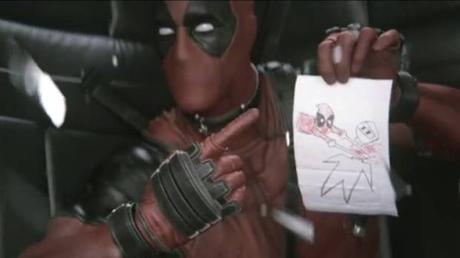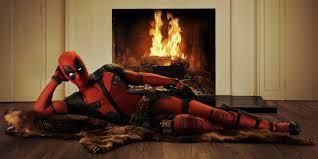Here’s a problem many films before Deadpool have faced and many films after Deadpool will continue to face: If you laugh at a particular storytelling formula which has become stale due to overuse but then fall into that same exact formula do you risk coming off as clever, but ultimately uninspired because if you were really gutsy you would have gone completely against the grain?
Here’s the solution: Just be really, really funny and insanely entertaining.
Deadpool’s opening credits hilariously eschew a standard listing of names (e.g., actors, writers, producers, the director) in favor of simply listing superhero movie tropes, my favorite of the bunch being “A British Villain.” You instantly think that the superhero genre is about to get the right kick in the ass it probably needs, especially after watching the almost comically self-serious trailers for X-Men: Apocalypse and Batman v Superman: Dawn of Justice which come attached to most screenings of Deadpool.
Whoa there, tiger. Deadpool‘s opening credits actually tell us “These are some of the things we all know superhero movies have” followed by an implied “and our movie will have those too, but don’t take it so seriously.” You can only really fail to completely reinvent the box if that’s actually what you set out to do. Deadpool isn’t here to save the superhero movie genre, if indeed it needs saving. Deadpool is here to entertain us with its anarchic comedy, R-rated action and basic hero’s journey origin story.
COURTESY SPOILER WARNING
Deadpool was once just regular ole Wade Wilson (Ryan Reynolds), a special forces vet who’d taken to regularly meeting in a mercenary hangout bar where missions are handed out in the form of gold cards with the names of potential targets. It’s not unlike the underground society of hitmen displayed in John Wick, just far less swankier and not nearly as cloak and dagger. Wade met and fell in love with local prostitute Vanessa (Morena Baccarin) at the bar, but after they shared an extended period of bliss he was diagnosed with stage 4 cancer spread throughout his entire body. He learned of a way to cure his cancer and become a superhero, but it turned into a personal hell of endless torture at the hands of a sadistic doctor Francis (Ed Skrein, aka, The British Villain) and his enforcer (Gina Carano), both of whom are super-powered mutants. The process ultimately worked, curing his cancer and triggering a mutation which grants him super healing powers, but it came at quite the price, leading Wade to become Deadpool and seek vengeance against Francis.

END SPOILER
If there is a criticism to be made it is that the scenes with Deadpool crackle with far more energy than anything in the flashbacks. Wade Wilson is a smart-ass motormouth in complete denial of his own heroic tendencies, and his relationship with Vanessa is easily the most simultaneously dirty and sweet love affair yet realized in a superhero movie. However, Deadpool is a fourth-wall breaking lunatic who delivers a seemingly non-stop barrage of pop culture jokes and gruesome kills. If you think of them as separate people, Deadpool knows he’s in a movie but Wade Wilson does not. That inherently lends Deadpool’s scenes more vibrancy than anything dealing with Wade Wilson’s sad backstory. Add on top of that director Tim Miller’s amazing, John Wick-esque fight scenes for Deadpool and it’s no contest.
That being said, I have never read a Deadpool comic book before nor have I played any Deadpool-branded video game. I know this character purely through X-Men Origins: Wolverine and a single episode of DisneyXD’s animated series Ultimate Spider-Man, where I found his diarrhea of the mouth tendencies remarkably annoying. There are arguments to be made against the continual re-telling of origin stories in superhero movies, and Deadpool is technically the second time we’ve seen this character’s origin story in film, a fact the movie itself references through several knowing put downs of the deeply regrettable Origins: Wolverine. However, that’s all the more reason Deadpool had to tell us where this character came from, giving us a new back story which can finally erase Origins: Wolverine from our memories.

He pulls this off partially by displaying the heart, no matter how immature, underneath the smirk in the cancer drama back story thus making him empathetic, but it’s also partially because by so consistently breaking the fourth wall he becomes a character we the superhero movie audience relates to. For example, right as we’re about to make a joke to ourselves about the jumbled continuity of the X-Men movies he beats us to the punch. The rest of the actors in the movie all deliver enjoyable performances, although T.J. Miller as Wade’s best friend leans in a little too much to a couple of meta jokes, but this is clearly Ryan Reynolds’ baby.
FINAL THOUGHTS
In their recent comprehensive history of Deadpool, Vulture argued the key to the character’s success is that he acts “as a pressure-release valve, directly addressing the audience to point out how ridiculous the whole superhero endeavor can be. And when his best writers take on his adventures, those de-suspensions of disbelief aren’t just catty winks — they’re a way to offer a loving critique of a genre that has taken over popular culture.”
That’s ultimately what the Deadpool movie is – a pressure-release valve. Broadly speaking, our superhero movies increasingly emphasize language-neutral action over story and character to better appeal to the global marketplace, and that process seemed to break Joss Whedon last year. Most of our superhero TV shows (Flash, Supergirl, Arrow, Legends of Tomorrow) cling to absolute sincerity despite increasingly silly and soapy story lines, coming off as heartfelt camp. Those which are a bit more mature (Agents of SHIELD, Agent Carter) are still watered down for mass consumption, and the edgier Netflix shows (Daredevil, Jessica Jones) are still figuring out how far they can go.
Here’s Deadpool, a bonafide R-rated Marvel movie with, at-best, an anti-hero as the lead, and a self-aware sense of humor. It’s tempting, then, to anoint it as an example of the type of experimental superhero entertainment the industry should be more interested in. Deadpool is not perfect, though. Its critique of the superhero genre is not as in-depth or interesting as it could have been, and there is a slight energy imbalance between the present day sequences and flashbacks. However, what they made is an incredibly fun, relentlessly immature, remarkably violent Deadpool movie, and I would haven’t it any other way.

